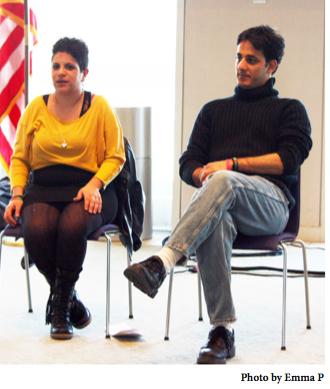Mira Dab and Amer Shurrab visited the UMB community to talk about the difficulties students face in obtaining an education in Palestine. Dab, who grew up in the West Bank, did not understand why her family emphasized education so much until education was denied her.
According to Dab, education was made illegal from 1987 to 1993 in the West Bank. Due to this, professors and students met outside of the classroom to learn and many were arrested. “Within the first six months of beginning school, eight of her friends were arrested for student activism.” Dab added that there are currently 87 students from her university in jail. There are also 300 children under the age of 18 in jail.
Dab discussed how checkpoints made it difficult to get to and from school (there were over 500 checkpoints and barriers). According to Dab, her school was only 20 minutes away but, because of the checkpoints, she would have to “leave the house at 6:00 AM for a 10:00 AM class.”
Shurrab grew up in Gaza and faced many of the same difficulties as Dab. He informed us that schools are consistently being destroyed. According to Shurrab, “there are 676 schools and about 81 percent operate in double shifts. There are approximately 40 students per classroom and roughly 520,000 K-twelve students.”
“98 percent of children under the age of 18 suffer from PTSD,” Shurrab went on to say. Studies support this disturbing number – citing that children are more susceptible to PTSD, than adults. Research supports that war torn regions, such as those in Gaza, are prime breeding grounds for this devastating psychological disorder.
“548 children were killed by Israelis in Gaza between the years 2000 and 2008. In the 2008-2009 assault on Gaza called ‘Operation Cast Lead,’ another 320 children under the age of 18 were killed.” Going to and from school in Palestine is a matter of life and death.
One of the questions asked was whether the students in the West Bank had any interaction with the students in Gaza. Dab responded by saying that they only have interaction via Skype (an online video chat). There was a time in which students from Gaza could attend the schools in West Bank. However, political instability soon made it impossible to do so.
Shurrab answered the question with an example. He once attended a summer camp here in the US. Both Palestinian and Israeli students participated and had a chance to talk about the occupation. One of the Palestinian students decided to ask all of the Israeli students, “Say you joined the Israeli military and you were sent to one of the barriers in Palestine. Since you know me, if you received orders to shoot me, would you?” According to Shurrab, “all but one said yes.”
Adding onto this question, another student asked if any of the Israeli students were against the occupation. In response to this, Dab mentioned that there was a small group that was against the occupation, but the group was too small to make a difference. This is why Dab and Shurrab came to the UMB community. Dab and Shurrab sees education as a weapon; the more people know about the disasters involved in the Israeli Occupation, the greater chance Palestine has to become free.
If you would like to sign the petition, you can do so at www.wedivest.org.





















































